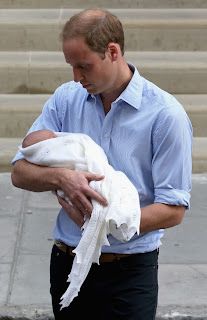Prince William's Paternity Leave: A Bold Move?
Reporting for royal diaper duty! Prince William is taking a two-week paternity leave following the birth of son George Alexander Louis, Buckingham Palace has confirmed to Yahoo! Shine.
Granted, Prince William certainly doesn’t need the paternity pay men receive under British law (which comes out to about $210 a week in his case), but by taking a paid break from his position as a Royal Air Force search-and-rescue helicopter pilot, he’s undoubtedly setting a new precedent for men everywhere.
Call it the Prince William Effect. Similar to how Kate Middleton’s choices have been known to trigger international frenzies — her cinched Jenny Packham dress proved that it's perfectly fine for new moms to bear their post-baby bump; her 8-carat sapphire-and-diamond engagement ring spawned dozens of knockoffs; and even those nude pantyhose evoked a 1980s revival — Prince William’s choice to take paternity leave (he's the first senior member of the royal family to do so) is generating plenty of social media buzz, too
Writer Jen Senior tweeted: “Somehow I missed this: Prince William is taking two week's paid paternity leave. BECAUSE HIS COUNTRY OFFERS IT.” @Jess Pensando tweeted, “2 weeks paternity leave for Prince William. Modern Dad?” @clairecm wrote, "Perfect occasion to re-start the paternity leave debate!" and @Keithlaw joked, "Isn't his whole life one big paternity leave?"
And paternity laws are way more flexible across the pond. “Now, in England, women are eligible for 52 weeks of leave and they can share a portion of that time with their spouse,” said Matos. “For example, the mother can take 26 weeks of maternity leave and if she decides to return to work afterward, her husband can take the remaining 26 weeks to care for their child.” While the father is on leave, he maintains his right to build his vacation days and may even be eligible for a pay raise. Yet, despite these perks (which were established in the U.K. in 2003), CBS reports that only two-thirds of British men take some paternity leave, and fewer than half take a full two weeks.
“In the United States, it’s very different,” Matos explained. “The only mandate is the Family Medical Leave Act ,which ensures that men and women receive 12 weeks of job-protected unpaid leave, but only under the condition that his or her company employs a certain number of workers who work in close quarters.” And paternity leave isn't even an option for most American workers. According to a story published in Forbes last month, only 13 percent of employers here offer paternity leave.
Unfortunately, no matter where a man resides, there's often a social stigma preventing him from accepting time off after the birth of a child — fear of being viewed as uncommitted to his job or even feminine, said Matos. And those fears aren’t necessarily unfounded: One study published in the Journal of Social Issues found that caregiving men get treated more disrespectfully at work than men who adhere to traditional gender roles. Maybe that's why, following the birth of a child, less than 5 percent of American dads took one month off, and 16 percent took no time at all, according to data released by the Center for Work and Family at Boston College.
That’s a shame because 92 percent of fathers report that paternity leave was a positive experience and that they would have enjoyed even more time off — dirty diapers, sleepless nights, and all.

Comments
Post a Comment
Thank you For Comment On Agnes Riola's